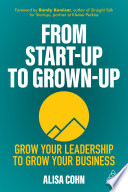

The book emphasizes the importance of recognizing the different stages of a company's growth - from startup to maturity. Each stage brings unique challenges and requires different strategies. Founders must transition from being hands-on in every aspect of the business to delegating responsibilities and empowering their teams. This shift is crucial for sustainable growth, as it allows leaders to focus on strategic planning rather than day-to-day operations. The author discusses various frameworks and models that can help entrepreneurs understand where their company stands and what the next steps should be. This understanding is vital for making informed decisions about resource allocation, talent management, and product development.
Continue readingAs companies grow, maintaining a strong organizational culture becomes increasingly important. The book argues that a clear set of values and a strong culture can drive employee engagement and retention, which are critical for long-term success. The author provides insights into how to cultivate a positive workplace culture, including the importance of transparency, communication, and inclusivity. He shares examples from various companies that have successfully navigated cultural challenges during their growth phases, highlighting the role of leadership in modeling and reinforcing these values. This idea underscores the notion that a company's culture can be a competitive advantage.
Continue readingScaling a business involves more than just increasing revenue; it requires a systematic approach to operations. The book outlines strategies for scaling operations effectively, including optimizing processes, leveraging technology, and ensuring that the right systems are in place to support growth. The author discusses the importance of metrics and data-driven decision-making in this context, encouraging leaders to adopt a mindset of continuous improvement. By sharing case studies and practical examples, the book illustrates how companies can navigate the complexities of scaling while maintaining quality and customer satisfaction.
Continue readingLeadership is a critical factor in a company's success, especially during periods of rapid growth. The book emphasizes the need for building a strong leadership team that can drive the organization forward. The author discusses the characteristics of effective leaders and the importance of diversity in leadership roles. He provides insights into how to identify and nurture leadership talent within the organization, as well as the importance of aligning leadership styles with the company's goals and culture. This idea highlights that the right leadership can inspire teams, foster innovation, and ultimately contribute to a company's growth trajectory.
Continue readingInnovation is key to staying competitive in today's market, and the book stresses the importance of a customer-centric approach to innovation. The author argues that understanding customer needs and feedback is essential for developing products and services that resonate with the target audience. He introduces frameworks for gathering customer insights and integrating them into the product development process. By showcasing examples of companies that have successfully implemented customer-centric innovation strategies, the book illustrates how this approach can lead to enhanced customer loyalty and business growth.
Continue readingEffective financial management is crucial for a growing company, and the book delves into various investment strategies and financial practices that can support growth. The author discusses budgeting, forecasting, and fundraising, providing practical advice on how to manage cash flow and attract investors. He emphasizes the importance of financial literacy for entrepreneurs and leaders, encouraging them to take an active role in understanding their company's financial health. This idea highlights that sound financial practices are not just about survival; they are essential for seizing growth opportunities.
Continue readingThe ability to adapt to change is a hallmark of successful companies, and the book highlights the importance of resilience in the face of challenges. The author discusses strategies for fostering a culture of adaptability, including encouraging experimentation and learning from failures. He provides examples of companies that have thrived by embracing change and pivoting their strategies when necessary. This idea underscores the notion that resilience is not just about weathering storms; it’s about being proactive and prepared for the inevitable changes that come with growth.
Continue readingThe reading time for From Start-Up to Grown-Up depends on the reader's pace. However, this concise book summary covers the 7 key ideas from From Start-Up to Grown-Up, allowing you to quickly understand the main concepts, insights, and practical applications in around 25 min.
From Start-Up to Grown-Up is definitely worth reading. The book covers essential topics including Understanding the Stages of Growth, The Importance of Culture and Values, Scaling Operations Effectively, providing practical insights and actionable advice. Whether you read the full book or our concise summary, From Start-Up to Grown-Up delivers valuable knowledge that can help you improve your understanding and apply these concepts in your personal or professional life.
From Start-Up to Grown-Up was written by Alisa Cohn.
If you enjoyed From Start-Up to Grown-Up by Alisa Cohn and want to explore similar topics or deepen your understanding, we highly recommend these related book summaries:
These books cover related themes, complementary concepts, and will help you build upon the knowledge gained from From Start-Up to Grown-Up. Each of these summaries provides concise insights that can further enhance your understanding and practical application of the ideas presented in From Start-Up to Grown-Up.